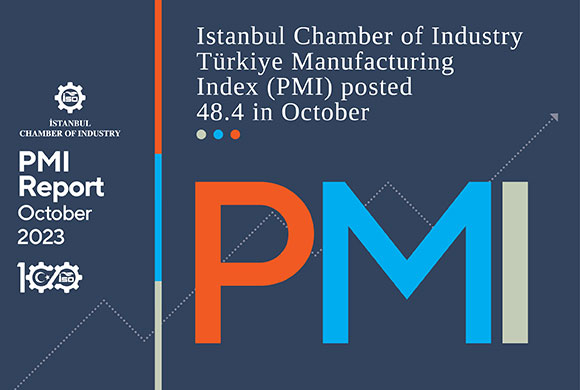News
ICI Released October 2023 Türkiye Manufacturing PMI and Türkiye Sector PMI Report
- 01.11.2023
- News

The Istanbul Chamber of Industry Türkiye Manufacturing PMI dipped to 48.4 in October 2023 from 49.6 in September. The index signalled a modest easing of business conditions during the month, but one that was more pronounced than that seen in September. New orders had the sharpest moderation in almost a year, and Renewed reduction in employment. There was some respite in terms of inflationary pressures.
According to the October report of Istanbul Chamber of Industry Türkiye Sector PMI, only two of the 10 monitored sectors increased their output, while most of the sectors decreased their staffing levels. On the other hand, rates of increase in input costs and selling prices eased for the third successive month in most of the sectors.
The October 2023 period of Istanbul Chamber of Industry (ISO) Turkey Manufacturing PMI (Purchasing Managers’ Index) survey, which is the fastest and reliable reference accepted in manufacturing industry performance of the economic growth was announced. According to the results of the survey where any figure greater than 50.0 indicates overall improvement of the sector, the headline PMI posted below the 50.0 no-change mark for the fourth consecutive month in October 2023.
At 48.4, the index signalled a modest easing of business conditions during the month, but one that was more pronounced than that seen in September (PMI at 49.6). Widespread demand weakness, both domestically and internationally, was signalled by manufacturers in October. As a result, total new orders and new export business moderated over the course of the month. Moreover, total new business slowed to the largest degree since last November. In line with the picture for new orders, production continued to be scaled back in October. Output has now eased in four consecutive months.
INFLATIONARY PRESSURES CONTINUE TO SOFTEN
October data signalled a renewed reduction in employment, thereby ending a five-month sequence of job creation. Panellists reported a mix of resignations and retirements. Despite lower staffing levels, firms were still able to reduce backlogs of work to the largest extent for almost a year. Manufacturers also scaled back their purchasing activity, stocks of purchases and inventories of finished goods in response to a drop in order requirements. Inflationary pressures continued to wane at the start of the final quarter of the year. Rates of increase in input costs and output prices each eased for the third successive month. Where prices did rise, this was often linked to currency weakness.
FIRMS STRUGGLING TO SECURE NEW ORDERS
Commenting on the Istanbul Chamber of Industry Türkiye Manufacturing PMI survey data, Andrew Harker, Economics Director at S&P Global Market Intelligence, said: “Demand conditions were the main limiting factor on the Turkish manufacturing sector in October, with firms struggling to secure sufficient volumes of new orders to support production and maintain staffing levels. There was some further respite in terms of inflation, however, which may provide some grounds for optimism that an improved demand environment can become established soon.”
OUTOUT RISES IN TWO SECTORS
According to the October report of Istanbul Chamber of Industry Türkiye Sector PMI, only two of the 10 monitored sectors increased their output, while most of the sectors decreased their staffing levels. On the other hand, rates of increase in input costs and selling prices eased for the third successive month in most of the sectors.
Due to weakness in both domestic and international demand, new orders slowed down in all monitored sectors for the first time in more than a year. In the textile sector, where the most significant slowdown was recorded, the decline reached its highest rate in the last 12 months. The slightest deceleration in new orders occurred in food products.
The strongest performance in production was seen in food products, where there was a limited increase compared to the previous month. Thus, the sector recorded growth over the last three months. Another sector that increased its production in October was machinery and metal products. The most significant slowdown was seen in textile companies.
Due to the decrease in production requirements, companies continued to be cautious in their hiring decisions in October. Staffing levels increased in only three of the ten sectors. Machinery and metal products, which recorded the highest increase in the last five months, also expanded its employment the fastest. On the other hand, the sharpest decline in staffing levels, as well as in production and new orders, was again in the textile sector.
PURCHASING ACTIVITIES DECREASES
In October, input cost inflation decreased in eight out of ten sectors followed, with the only exceptions of the machinery and metal products sector and the clothing and leather products sector. The slowest increase in input prices took place in the machinery and metal products sector, where the lowest inflation in nearly four years was measured. The easing in cost inflation and challenging demand conditions led base metal companies to reduce their selling prices for the first time in the last 32 months. While textile companies also reduced their prices, increases continued in all other sectors. The fastest increase in sales prices was recorded in food products.
Finally, purchasing activity decreased in all sectors in October for the first time in more than a year. Among the ten monitored sectors, the weakest performance was again observed in the textile sector.
*You can find attached the Istanbul Chamber of Industry Türkiye Manufacturing PMI and Sector PMI October 2023 reports.